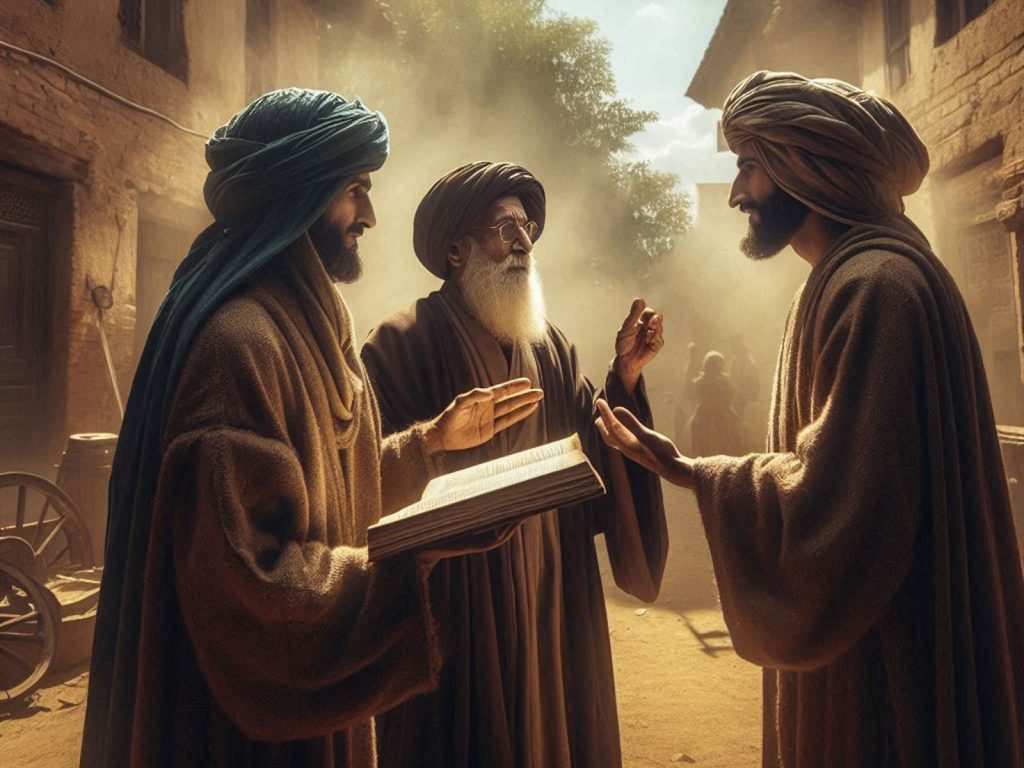– “O Ibn Ramin! When the Prophet (peace be upon him and his family) left Medina (for the Battle of Tabuk), did he appoint anyone to take his place?”
– Ibn Ramin: “Yes, he appointed Ali (peace be upon him) as his successor.”[3]
– Al-Raffa’: “Then why didn’t he say to the people of Medina, ‘Choose someone for yourselves, for you will never go astray [and your community will never fall into error]?”
– Ibn Ramin: “Because the Prophet was concerned about conflict and discord among the people.”
– Al-Raffa’: “What would be wrong if a disagreement had occurred? Surely, when he returned from the journey, he would resolve it.”
– Ibn Ramin: “But the action of the Messenger of God, by appointing a successor during his absence, was more prudent, appropriate, and logical.”
– Al-Raffa’: “Therefore, he must certainly have appointed someone to succeed him after his death.”
– Ibn Ramin: “No, that was not the case!”
– Al-Raffa’: “Wasn’t the Prophet’s death more significant than his journey? Earthly journeys are short, but the journey of death is long and eternal. How is it that at the time of his death, he was not concerned about discord within the ummah and did not appoint a successor, but during a short earthly journey, he worried about the ummah and appointed a successor despite being alive and able to resolve conflicts himself?”
– Ibn Ramin was unable to respond to Abu al-Hasan al-Raffa’s logical reasoning and remained silent.[4]
From the beginning of his mission until his death, the Messenger of God (peace be upon him and his family), following divine command and in various ways, introduced his successor. By establishing the criteria for leadership and demonstrating the worthiness of Imam Ali (peace be upon him) for this important position, he laid the necessary groundwork for the continuation of his movement. The pages of history are a living witness to this claim, and the existing historical records serve as strong and solid proof of this truth and of his worthiness.[5]
The matter of the succession and vicegerency of Imam Ali (peace be upon him) was so clear to everyone that when the Prophet (peace be upon him and his family) informed the Muslims of his approaching death, they asked about all the affairs that needed to be managed after his death, except for his succession, because they were already certain of it and had no need to inquire. They asked about his washing, shrouding, who would pray over him, where he should be buried, and other matters,[6] but no one asked, “Who will lead the ummah after you?” Is it not that the matter of leadership was already clarified, and the Prophet (peace be upon him and his family) had repeatedly explained it and introduced his successor to everyone?
The truth is, they did not ask anything about this matter because they knew that at Ghadir, the Messenger of God (peace be upon him and his family) had completed the proof and had taken allegiance from everyone for the Imam.
There is extensive evidence and numerous esteemed books and works, such as Al-Ghadir, which have proven hundreds of times that the Messenger of God (peace be upon him and his family) did not neglect introducing his successor and took all necessary actions to establish the Imamate of Imam Ali (peace be upon him) so that, as Lady Fatimah (peace be upon her) said, no excuse remained for anyone,[7] and people could turn to the rightful Imam and follow the straight path by obeying him. It is inconceivable that the Messenger of guidance and mercy would have neglected such a crucial matter; surely, the failure was on the part of the Muslims who were deceived by Satan and, like the followers of Moses (peace be upon him), were misled by the schemes of Samiri despite all the emphasis and counsel, and they turned to the world, setting aside the family of the Prophet.
Indeed, from that day, due to forgetting the Prophet’s message, calamities and misfortunes were cast upon the Islamic ummah, persisting until today, in the hope that perhaps one day the Muslims will awaken and return to the straight path.
Adapted from the book “Imam; the Unique of His Time” authored by Dr. Morteza Taheri (with slight changes and additions).
Footnotes:
[1] “Abu al-Hasan al-Raffa’” (d. around 360 AH in Baghdad) was a famous Shia poet.
[2] Abd al-Wahhab ibn Muhammad ibn Umar ibn Muhammad al-Baghdadi al-Shafi’i, known as “Ibn Ramin,” was a Shafi’i jurist who died in 430 AH.
[3] This refers to the Battle of Tabuk. In Rajab of the 9th year AH, the Prophet (peace be upon him and his family) departed to confront the Romans. Before leaving Medina, he appointed Imam Ali (peace be upon him) as his successor due to concerns and sensitivities regarding the situation. (Al-Irshad, vol. 1, p. 156; Sirat Ibn Hisham, vol. 2, p. 519).
The Prophet’s practice of appointing someone as his successor when leaving Medina can be observed and followed in all his expeditions. For further reading, refer to this link.
[4] Manaqib Al Abi Talib, vol. 1, p. 258.
[5] For example, the Event of Yawm al-Indhar (History of Tabari, vol. 2, p. 320), the Event of Ghadir (Al-Ghadir, vol. 1, pp. 14–72), the Event of Manzilah (Sahih Muslim, vol. 15, p. 174), the Event of the Standard (History of Yaqubi, vol. 2, p. 56), and numerous other events.
[6] History of Tabari, vol. 1, pp. 1804–1806; Tarf min al-Anba’ wa al-Manaqib by Sayyid Ibn Tawus, p. 545, etc.
[7] Al-Khisal, vol. 1, p. 173.


